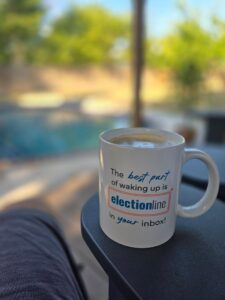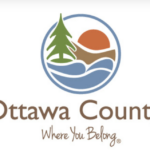In Focus This Week
Helping America Vote: The Book
By Wendy Underhill
National Conference of State Legislatures
Here’s a pop quiz: How do elections work in the U.S.?
a) Accurately and transparently, given how much double-checking is built into the processes that govern voter registration, voting and counting ballots.
b) Differently, at least a little bit, depending on the state or jurisdiction.
c) With support from fellow Americans who have chosen to be election professionals, and 700,000 others who serve as temporary election workers.
d) All of the above.
The short answer is, of course, d.
 For a longer answer, see Helping America Vote: Election Administration in the U.S., a new publication from the bipartisan U.S. Election Assistance Commission (EAC) and the also-bipartisan National Conference of State Legislatures (NCSL).
For a longer answer, see Helping America Vote: Election Administration in the U.S., a new publication from the bipartisan U.S. Election Assistance Commission (EAC) and the also-bipartisan National Conference of State Legislatures (NCSL).
The title plays off the Help America Vote Act of 2002, the most recent major federal legislation to address elections.
Even though federal laws matter, “elections are a state responsibility; the constitution is clear on that,” says Tim Storey, NCSL’s chief executive officer. “No wonder then that procedures vary across the states and territories. It is impossible to give a single answer to how elections work without diving deep into details.”
Instead, the 190-page Helping America Vote primer provides a procedural overview. It starts with how electoral districts and precincts are created, and then follows through with candidate filing, ballot design, voter registration, voting itself either on or before Election Day, election certification and results auding.
The book also addresses the complex web that governs elections, plus voting technology, specific needs of military and overseas voters, how presidential elections compare to all other elections, and alternative voting methods.
The book is 100% descriptive (and 0% prescriptive). NCSL and the EAC recognized that those who are new to election administration or new to policymaking on elections (think: lawmakers) needed a soup-to-nuts explanation of the steps it takes to run an accurate, secure and accessible election.
“It’s a great resource for the most fundamental and best practices across the country,” said Commissioner Don Palmer, one of the four EAC commissioners. “If you are interested in audits, go to the audit chapter. You’ll find plenty of ideas. The same with any other question. There’s a chapter on it.”
To balance the reference book style, each chapter has an interview with an election official who brings that topic to life. Common threads from these 19 interviews? Election officials will make just about anything lawmakers want to have happen, happen—they just need time and resources. And they will do their work outside the reach of politics. They focus on “what can work not for your party, and not for my party, but for the American people,” EAC Commissioner Tom Hicks reports.
“Helping America Vote, we hope and expect, will be a reference that election officials and others can dip into to get what they want, when they want it,” Storey said. “And, because it does not include state-by-state data, this book will be evergreen, with a years-long shelf life.”
For state-by-state data, NCSL and the EAC both provide up-to-the-minute resources that can and are changed as states adjust their processes.
Other Books on Election Administration
How We Vote by Kathleen Hale and Mitchell Brown (Georgetown University Press, 2020) comes close, but focuses on the election officials’ role and provides academic analysis. The same with Local Election Administrators in the United States: The Frontline of Democracy (Palgrave Macmillan Cham, 2024), which gathers essays from leading scholars in the field of election science.
And there’s the venerable Election Administration in the United States, by Joseph P. Harris (Brookings Institution, 1934, now available as a pdf from the National Institute of Standards and Technology). While interesting to see that the issues identified in the 1930s are still with the nation almost a century later: who is eligible to vote and how do we know that; where and how voting takes place; how to secure processes and votes.
electionline Daily News Email
 What’s the best part of waking up? electionline Daily News in your inbox of course so be sure to sign up for your daily dose.
What’s the best part of waking up? electionline Daily News in your inbox of course so be sure to sign up for your daily dose.
Each morning you’ll receive the top headlines of the day, plus a listing of states featured in that day’s news round up.
To sign up, simply visit our site and provide us with your email and you’ll begin receiving the news in your inbox each morning.
We Google so you don’t have to!
Election News This Week
 Federal Update: There was more elections-related action in Washington this week. According to Democracy Docket, on April 11 the U.S. Election Assistance Commission sent a letter to state elections officials “seeking consultation” on how they would apply President Donald J. Trump’s proof of citizenship demand if his executive order ultimately stands — and how the new requirement would affect voter registration in their states. According to the article, even though there is litigation pending against the EO, the EAC is nonetheless moving forward and initiated the process of putting the citizenship requirement into effect. In the letter, which was sent by EAC Executive Director Briannna Schletz, the commission also described Trump’s order as providing “instruction to the EAC.” Chairman Donald Palmer told The Associated Press the agency was following the law, which governs the way any proposed change to the federal form can be made. “That’s the process that we’ve done in the past, and that’s the process we did this time,” Palmer said. “In my mind, this is really to get information from the states.” According to Reuters, the U.S. Justice Department is reassigning about a dozen senior career attorneys from its civil rights units as the administration steers the division away from its historic priorities. At least three senior career attorneys who managed offices that investigated abuse by police and handled violations of voting and disability rights, have been ordered to take other assignments, three of the people, who were granted anonymity to discuss moves that had not been made public, told Reuters. “It’s been a complete bloodbath,” said a senior Justice Department lawyer in the division who is not authorized to speak publicly. The Secure Families Initiative has joined a lawsuit challenging the constitutionality of Trump’s executive order imposing stricter voting requirements, arguing it would add barriers for troops and families who vote by absentee ballot. The biggest effect on military voter participation is likely the new ballot return deadline, said Sarah Streyder, a military wife living overseas who serves as the executive director of the Secure Families Initiative. On the security front, Bob Lord, senior technical adviser and Lauren Zabierek, senior advisor at CISA, were two of the chief architects behind CISA’s Secure by Design initiative, which garnered voluntary commitments from major vendors and manufacturers to build cybersecurity protections into their products at the design stage have departed the agency. And Chris Krebs has resigned from SentinelOne, saying he needs to devote himself fully to fighting the executive order President Donald Trump signed to target the former CISA director. On the Congressional front, the California Association of Clerks and Elections Officials sent a letter to key members of the Senate expressing their concerns about the SAVE Act.
Federal Update: There was more elections-related action in Washington this week. According to Democracy Docket, on April 11 the U.S. Election Assistance Commission sent a letter to state elections officials “seeking consultation” on how they would apply President Donald J. Trump’s proof of citizenship demand if his executive order ultimately stands — and how the new requirement would affect voter registration in their states. According to the article, even though there is litigation pending against the EO, the EAC is nonetheless moving forward and initiated the process of putting the citizenship requirement into effect. In the letter, which was sent by EAC Executive Director Briannna Schletz, the commission also described Trump’s order as providing “instruction to the EAC.” Chairman Donald Palmer told The Associated Press the agency was following the law, which governs the way any proposed change to the federal form can be made. “That’s the process that we’ve done in the past, and that’s the process we did this time,” Palmer said. “In my mind, this is really to get information from the states.” According to Reuters, the U.S. Justice Department is reassigning about a dozen senior career attorneys from its civil rights units as the administration steers the division away from its historic priorities. At least three senior career attorneys who managed offices that investigated abuse by police and handled violations of voting and disability rights, have been ordered to take other assignments, three of the people, who were granted anonymity to discuss moves that had not been made public, told Reuters. “It’s been a complete bloodbath,” said a senior Justice Department lawyer in the division who is not authorized to speak publicly. The Secure Families Initiative has joined a lawsuit challenging the constitutionality of Trump’s executive order imposing stricter voting requirements, arguing it would add barriers for troops and families who vote by absentee ballot. The biggest effect on military voter participation is likely the new ballot return deadline, said Sarah Streyder, a military wife living overseas who serves as the executive director of the Secure Families Initiative. On the security front, Bob Lord, senior technical adviser and Lauren Zabierek, senior advisor at CISA, were two of the chief architects behind CISA’s Secure by Design initiative, which garnered voluntary commitments from major vendors and manufacturers to build cybersecurity protections into their products at the design stage have departed the agency. And Chris Krebs has resigned from SentinelOne, saying he needs to devote himself fully to fighting the executive order President Donald Trump signed to target the former CISA director. On the Congressional front, the California Association of Clerks and Elections Officials sent a letter to key members of the Senate expressing their concerns about the SAVE Act.
 Election Security: According to Votebeat, Arizona’s Mohave County plans to add security features to its ballot paper for the 2026 midterm election, a measure officials hope will improve voter confidence. The features could include watermarks or invisible fibers, according to a contract with election printing vendor Runbeck Election Services that county supervisors unanimously voted to approve this week. The features will cost somewhere between 10 to 15 cents a ballot, according to Runbeck’s proposal. About 83,000 Mohave County voters cast ballots in the last midterm election. Supervisors Chairman Travis Lingenfelter told Votebeat in an interview that he thinks the change is worth the cost if it improves voter confidence, and he hopes other counties will follow. Runbeck said it can offer invisible fibers, a watermark, an infrared taggant and paper that doesn’t respond to UV light. It’s unclear at this point which features Mohave County will add, or how much it will ultimately cost. A recent test in Cochise County found that voting machines from Election Systems & Software, which Mohave County also uses, can properly tabulate ballots using Runbeck’s features.
Election Security: According to Votebeat, Arizona’s Mohave County plans to add security features to its ballot paper for the 2026 midterm election, a measure officials hope will improve voter confidence. The features could include watermarks or invisible fibers, according to a contract with election printing vendor Runbeck Election Services that county supervisors unanimously voted to approve this week. The features will cost somewhere between 10 to 15 cents a ballot, according to Runbeck’s proposal. About 83,000 Mohave County voters cast ballots in the last midterm election. Supervisors Chairman Travis Lingenfelter told Votebeat in an interview that he thinks the change is worth the cost if it improves voter confidence, and he hopes other counties will follow. Runbeck said it can offer invisible fibers, a watermark, an infrared taggant and paper that doesn’t respond to UV light. It’s unclear at this point which features Mohave County will add, or how much it will ultimately cost. A recent test in Cochise County found that voting machines from Election Systems & Software, which Mohave County also uses, can properly tabulate ballots using Runbeck’s features.
 New Site Who ‘Dis: The Ottawa County, Michigan clerk’s office is set to launch a new website in advance of the May primary. A part of the county’s push for “continuous improvement” in its elections, the new website will allow users to interact with the results through a series of charts and graphs. A map feature will also let voters view results in specific precincts, so they can focus on a candidate’s performance in their hometown. “I always say that accuracy is more important than timeliness,” said Ottawa County Clerk Justin Roebuck. “But timeliness is really an important aspect of our customer service and building trust and confidence in the election process.” Downloadable reports will be available, too. “I might not be the only election nerd in Ottawa County who likes that kind of stuff,” Roebuck said. “We want to make sure we’ve got a good, transparent reporting process.” In August 2024, Ottawa County’s current unofficial election results website crashed shortly after polls closed on Tuesday night. Thousands of visitors had generated more than 100,000 hits, trying to view a number of hotly-contested primary races for county commission. “That obviously overtaxed the website,” Roebuck said, adding that the county was already shopping for new software at the time. “This [new website] is a great step forward in continuously improving that process.” The new website, capable of handling large amounts of traffic, comes courtesy of a four-year contract ($9,000 per year) with SOE Software, with an option for a three-year renewal at the same rate.
New Site Who ‘Dis: The Ottawa County, Michigan clerk’s office is set to launch a new website in advance of the May primary. A part of the county’s push for “continuous improvement” in its elections, the new website will allow users to interact with the results through a series of charts and graphs. A map feature will also let voters view results in specific precincts, so they can focus on a candidate’s performance in their hometown. “I always say that accuracy is more important than timeliness,” said Ottawa County Clerk Justin Roebuck. “But timeliness is really an important aspect of our customer service and building trust and confidence in the election process.” Downloadable reports will be available, too. “I might not be the only election nerd in Ottawa County who likes that kind of stuff,” Roebuck said. “We want to make sure we’ve got a good, transparent reporting process.” In August 2024, Ottawa County’s current unofficial election results website crashed shortly after polls closed on Tuesday night. Thousands of visitors had generated more than 100,000 hits, trying to view a number of hotly-contested primary races for county commission. “That obviously overtaxed the website,” Roebuck said, adding that the county was already shopping for new software at the time. “This [new website] is a great step forward in continuously improving that process.” The new website, capable of handling large amounts of traffic, comes courtesy of a four-year contract ($9,000 per year) with SOE Software, with an option for a three-year renewal at the same rate.
 Sticker News: Rory Ensweiler and Gregorio Landaluce, both elementary school students at Mt.
Sticker News: Rory Ensweiler and Gregorio Landaluce, both elementary school students at Mt.  Eccles, in Cordova Alaska are the brains behind the two “I voted” stickers that poll workers handed out during the city’s recent municipal election. Their designs, which featured their favorite parts of Cordova, emerged victorious out of a pool of 20 entries, according to Cordova Deputy Clerk Colette Gilmour. The sticker design contest was open to students from third through sixth grade. After the submission deadline on Jan. 31, Gilmour said city employees voted for their top three designs. The six with the most votes then went to the City Council, who voted for the top two. “It was a hard call because all the designs showed great imagination and local pride,” Gilmour said.
Eccles, in Cordova Alaska are the brains behind the two “I voted” stickers that poll workers handed out during the city’s recent municipal election. Their designs, which featured their favorite parts of Cordova, emerged victorious out of a pool of 20 entries, according to Cordova Deputy Clerk Colette Gilmour. The sticker design contest was open to students from third through sixth grade. After the submission deadline on Jan. 31, Gilmour said city employees voted for their top three designs. The six with the most votes then went to the City Council, who voted for the top two. “It was a hard call because all the designs showed great imagination and local pride,” Gilmour said.
Personnel News: Christy Gaskins has been named the new Gaskins County, North Carolina board of elections director. Former elections official Scott O. Konopasek has announced his candidacy for the Virginia House of Delegates.
Ballot Measures, Legislation & Rulemaking
 Alabama: The House passed a bill that would prohibit the state from participating in the Electronic Registration Information Center (ERIC). The bill’s passage is the latest step in Alabama’s retreat from ERIC in favor of the Alabama Voter Integrity Database, a file created by Secretary of State Wes Allen in 2023. Alabama is one of nine conservative states that have switched to AVID, though how it functions and the extent of its capabilities remain mostly private.
Alabama: The House passed a bill that would prohibit the state from participating in the Electronic Registration Information Center (ERIC). The bill’s passage is the latest step in Alabama’s retreat from ERIC in favor of the Alabama Voter Integrity Database, a file created by Secretary of State Wes Allen in 2023. Alabama is one of nine conservative states that have switched to AVID, though how it functions and the extent of its capabilities remain mostly private.
 Connecticut: House Bill 7229 would require that all state Department of Corrections facilities carry absentee ballots specifically designated for eligible incarcerated people. In Connecticut, people convicted of felonies are ineligible to vote. But people awaiting trial and those convicted of misdemeanor charges, which made up 30 percent of the state’s incarcerated population in 2019, are eligible voters. However, Ashley McCarthy, director of external affairs for the Connecticut Department of Corrections, said that logistical challenges often discourage eligible incarcerated people from voting. McCarthy explained that they must undergo a time-consuming process: requesting voter registration paperwork from their prison unit manager or counselor and filling it out; requesting an application for an absentee ballot from their town clerk; completing the application and mailing it to their town clerk; receiving and filling out the absentee ballot itself; and mailing the absentee ballot to their town clerk. By requiring Department of Corrections facilities to carry special absentee ballots, the bill would streamline this process for eligible voters. The only mail the prisoners would have to send would be the ballot itself.
Connecticut: House Bill 7229 would require that all state Department of Corrections facilities carry absentee ballots specifically designated for eligible incarcerated people. In Connecticut, people convicted of felonies are ineligible to vote. But people awaiting trial and those convicted of misdemeanor charges, which made up 30 percent of the state’s incarcerated population in 2019, are eligible voters. However, Ashley McCarthy, director of external affairs for the Connecticut Department of Corrections, said that logistical challenges often discourage eligible incarcerated people from voting. McCarthy explained that they must undergo a time-consuming process: requesting voter registration paperwork from their prison unit manager or counselor and filling it out; requesting an application for an absentee ballot from their town clerk; completing the application and mailing it to their town clerk; receiving and filling out the absentee ballot itself; and mailing the absentee ballot to their town clerk. By requiring Department of Corrections facilities to carry special absentee ballots, the bill would streamline this process for eligible voters. The only mail the prisoners would have to send would be the ballot itself.
 Michigan Ballot Measure: Backers of an effort to require new Michigan voters to produce proof of their U.S. citizenship have the go-ahead to begin their petition drive to get the question on the ballot next November as a proposed constitutional amendment. The bipartisan Board of State Canvassers unanimously approved a 96-word summary of the proposal that will appear on petitions around Michigan. That starts a 180-day clock for the Committee to Protect Voters’ Rights, a group that’s leading the petition drive, to gather nearly 450,000 valid signatures from registered voters across the state. The group, which also operates under the name “Prove It, Michigan,” has previously challenged state-level expansions to voting rights. Petition circulators will have 180 days from approval to gather 446,198 valid signatures of registered voters, a number based on the total votes cast in the last gubernatorial race. After the signatures are submitted, the state will have to verify them. If enough valid ones are gathered, the question will appear on next fall’s ballot.
Michigan Ballot Measure: Backers of an effort to require new Michigan voters to produce proof of their U.S. citizenship have the go-ahead to begin their petition drive to get the question on the ballot next November as a proposed constitutional amendment. The bipartisan Board of State Canvassers unanimously approved a 96-word summary of the proposal that will appear on petitions around Michigan. That starts a 180-day clock for the Committee to Protect Voters’ Rights, a group that’s leading the petition drive, to gather nearly 450,000 valid signatures from registered voters across the state. The group, which also operates under the name “Prove It, Michigan,” has previously challenged state-level expansions to voting rights. Petition circulators will have 180 days from approval to gather 446,198 valid signatures of registered voters, a number based on the total votes cast in the last gubernatorial race. After the signatures are submitted, the state will have to verify them. If enough valid ones are gathered, the question will appear on next fall’s ballot.
 Indiana: A bill requiring the oath of ballot counter for provisional ballots to be sent to the state election division died after a hearing in the House Elections and Apportionment committee. Sen. Dan Dernulc, R-Highland, authored Senate Bill 186, which would require the circuit court clerk to give a copy of each oath counter on provisional ballots to the election division no later than 30 days after the election. Chairman of the House Elections and Apportionment committee Rep. Timothy Wesco, R-Osceola, offered an amendment to the bill to remove the requirement for the circuit court clerk to transmit a copy of each oath taken by a ballot counter for the 2024 election. The amendment was adopted unanimously during a March House Elections and Apportionment committee meeting. The bill was held during the March 26 committee meeting and was not heard in committee after that.
Indiana: A bill requiring the oath of ballot counter for provisional ballots to be sent to the state election division died after a hearing in the House Elections and Apportionment committee. Sen. Dan Dernulc, R-Highland, authored Senate Bill 186, which would require the circuit court clerk to give a copy of each oath counter on provisional ballots to the election division no later than 30 days after the election. Chairman of the House Elections and Apportionment committee Rep. Timothy Wesco, R-Osceola, offered an amendment to the bill to remove the requirement for the circuit court clerk to transmit a copy of each oath taken by a ballot counter for the 2024 election. The amendment was adopted unanimously during a March House Elections and Apportionment committee meeting. The bill was held during the March 26 committee meeting and was not heard in committee after that.
 New York: For the fifth straight legislative term, state assembly member Clyde Vanel has introduced a bill that would order the state to study whether using distributed ledger technology, better known as blockchain, could “protect” voter records and election results. Identical bills introduced in sessions dating back to 2017 haven’t found traction. Though the legislation only calls for the study of the technology’s potential use, by first enlisting experts in blockchain technology, voter fraud, cybersecurity, voter records and election results, reception of such technologies in 2025 remains tepid at best. Vanel, an intellectual property attorney and Democrat, in 2019 said he believed that governments must not neglect cryptocurrencies or blockchain technology. He pointed to a 2016 New York City Board of Elections scandal in which 117,000 Brooklyn voters were improperly purged from voter rolls, an incident he said could have been sidestepped if the board had been using an immutable public ledger like that offered by blockchain.
New York: For the fifth straight legislative term, state assembly member Clyde Vanel has introduced a bill that would order the state to study whether using distributed ledger technology, better known as blockchain, could “protect” voter records and election results. Identical bills introduced in sessions dating back to 2017 haven’t found traction. Though the legislation only calls for the study of the technology’s potential use, by first enlisting experts in blockchain technology, voter fraud, cybersecurity, voter records and election results, reception of such technologies in 2025 remains tepid at best. Vanel, an intellectual property attorney and Democrat, in 2019 said he believed that governments must not neglect cryptocurrencies or blockchain technology. He pointed to a 2016 New York City Board of Elections scandal in which 117,000 Brooklyn voters were improperly purged from voter rolls, an incident he said could have been sidestepped if the board had been using an immutable public ledger like that offered by blockchain.
 North Dakota: Mail-in ballots are counted in North Dakota so long as they’re postmarked by the day before Election Day and are delivered within 13 days of the election. House Bill 1165 would amend this to require mail-in ballots to be received by an election officer by the time the polls close. The amendment was made to comply with a March 25 executive order issued by President Donald Trump that forbids states from counting mail-in ballots received after Election Day. The bill was originally intended to clean up state law governing elections procedures. The main purpose of the bill is to make ballots easier for voters to understand and make election practices more uniform across the state. It addresses things like write-in candidate deadlines, what counts as a valid residential address and who can remove election judges, for example. The Senate State and Local Government Committee during committee discussion earlier this month added the deadline change for mail-in ballots. The amendment was brought by the Secretary of State’s Office, according to Deputy Secretary of State Sandra McMerty. McMerty in a statement to the North Dakota Monitor said the change was suggested to comply with the executive order and to “remove uncertainty and inconsistencies surrounding postmarking requirements of the USPS.” Since the amendment was introduced after the bill’s public hearing in the Senate, the public did not have an opportunity to comment on the proposed changes. McMerty said the Secretary of State’s Office doesn’t anticipate the change causing any problems either. “We don’t foresee significant barriers to voters as 0.1% of absentee ballots in the general election were postmarked prior to Election Day and delivered to the county after Election Day,” she told the Monitor. The Senate last week voted 43-4 to pass the bill. The House on Monday approved the amended bill by a vote of 85-7.
North Dakota: Mail-in ballots are counted in North Dakota so long as they’re postmarked by the day before Election Day and are delivered within 13 days of the election. House Bill 1165 would amend this to require mail-in ballots to be received by an election officer by the time the polls close. The amendment was made to comply with a March 25 executive order issued by President Donald Trump that forbids states from counting mail-in ballots received after Election Day. The bill was originally intended to clean up state law governing elections procedures. The main purpose of the bill is to make ballots easier for voters to understand and make election practices more uniform across the state. It addresses things like write-in candidate deadlines, what counts as a valid residential address and who can remove election judges, for example. The Senate State and Local Government Committee during committee discussion earlier this month added the deadline change for mail-in ballots. The amendment was brought by the Secretary of State’s Office, according to Deputy Secretary of State Sandra McMerty. McMerty in a statement to the North Dakota Monitor said the change was suggested to comply with the executive order and to “remove uncertainty and inconsistencies surrounding postmarking requirements of the USPS.” Since the amendment was introduced after the bill’s public hearing in the Senate, the public did not have an opportunity to comment on the proposed changes. McMerty said the Secretary of State’s Office doesn’t anticipate the change causing any problems either. “We don’t foresee significant barriers to voters as 0.1% of absentee ballots in the general election were postmarked prior to Election Day and delivered to the county after Election Day,” she told the Monitor. The Senate last week voted 43-4 to pass the bill. The House on Monday approved the amended bill by a vote of 85-7.
 Tennessee: Sponsored by two Williamson County lawmakers, Rep. Lee Reeves in the House and Sen. Jack Johnson in the State Senate, HB0855/SB0799 requires political parties to use primary elections, not conventions or caucuses, to nominate candidates for county partisan races. Current Tennessee law already requires positions like governor, state legislators and U.S. senators and representatives to be nominated by primary election. “This bill ensures Tennessee voters, not party insiders, choose their candidates,” Reeves said in a press release. “I’m proud to stand with the busy parents, deployed service members, first responders, senior citizens and other Tennesseans who want their voice heard. The voters of Tennessee stand with me on this issue and want accessible, transparent and fair opportunities to choose their nominees.” Any statewide political party that used non-primary methods to nominate candidates in 2022 or 2024 may continue doing so for county offices, but this clause only applies to a handful of small counties across the state. The bill also provides exceptions for unexpected vacancies that must be filled outside of a typical election cycle.
Tennessee: Sponsored by two Williamson County lawmakers, Rep. Lee Reeves in the House and Sen. Jack Johnson in the State Senate, HB0855/SB0799 requires political parties to use primary elections, not conventions or caucuses, to nominate candidates for county partisan races. Current Tennessee law already requires positions like governor, state legislators and U.S. senators and representatives to be nominated by primary election. “This bill ensures Tennessee voters, not party insiders, choose their candidates,” Reeves said in a press release. “I’m proud to stand with the busy parents, deployed service members, first responders, senior citizens and other Tennesseans who want their voice heard. The voters of Tennessee stand with me on this issue and want accessible, transparent and fair opportunities to choose their nominees.” Any statewide political party that used non-primary methods to nominate candidates in 2022 or 2024 may continue doing so for county offices, but this clause only applies to a handful of small counties across the state. The bill also provides exceptions for unexpected vacancies that must be filled outside of a typical election cycle.
 Wisconsin: The Wisconsin Legislature’s Joint Committee for the Review of Administrative Rules (JCRAR) heard testimony this week on a proposed set of rules to guide the conduct of election observers. The rule, proposed by the Wisconsin Elections Commission (WEC), provides more detail for what observers are allowed to do and where they are allowed to position themselves at polling places, and lays out the process for how an unruly observer can be removed. The rule’s final text was created with input from an advisory committee consisting of representatives of major and minor political parties, election clerks, disability rights groups and right-wing election conspiracy groups. The two most recent WEC chairs, Ann Jacobs, a Democrat, and Don Millis, a Republican, opened the testimony with each saying they have individual quibbles about the rule but the final text is the result of two years of consensus building and that legislators shouldn’t reject the rule because it isn’t perfect.
Wisconsin: The Wisconsin Legislature’s Joint Committee for the Review of Administrative Rules (JCRAR) heard testimony this week on a proposed set of rules to guide the conduct of election observers. The rule, proposed by the Wisconsin Elections Commission (WEC), provides more detail for what observers are allowed to do and where they are allowed to position themselves at polling places, and lays out the process for how an unruly observer can be removed. The rule’s final text was created with input from an advisory committee consisting of representatives of major and minor political parties, election clerks, disability rights groups and right-wing election conspiracy groups. The two most recent WEC chairs, Ann Jacobs, a Democrat, and Don Millis, a Republican, opened the testimony with each saying they have individual quibbles about the rule but the final text is the result of two years of consensus building and that legislators shouldn’t reject the rule because it isn’t perfect.
Legal Updates
 Federal Litigation: Following a hearing last week, U.S. District Judge Colleen Kollar-Kotelly said she would wait to decide whether to grant a preliminary injunction to national Democrats and voting rights groups that are challenging President Donald Trump’s recent executive order on elections. Kollar-Kotelly said she would consider each party’s responses to her questions and aim for a ruling this week, although none had been delivered at press time. The Democratic National Committee, the League of United Latin American Citizens, the League of Women Voters Education Fund and others are seeking to block Trump’s sweeping overhaul of federal election processes, which, among other changes, would require proof of citizenship to register to vote in federal elections. The Republican president’s executive order says the U.S. has failed “to enforce basic and necessary election protections” and calls on states to work with federal agencies to share voter lists and prosecute election crimes. It threatens to pull federal funding from states where election officials don’t comply. The plaintiffs argue the order is illegal because it asserts power that he does not have over an independent agency. That agency, the U.S. Election Assistance Commission, sets voluntary voting system guidelines and maintains the federal voter registration form. The plaintiffs also argue the order violates the Constitution, which says that states — not the president — get to decide the “times, places and manner” of how elections are run. The Constitution’s so-called Elections Clause also gives Congress the power to “make or alter” election regulations, at least for federal office, but it doesn’t mention any presidential authority over election administration.
Federal Litigation: Following a hearing last week, U.S. District Judge Colleen Kollar-Kotelly said she would wait to decide whether to grant a preliminary injunction to national Democrats and voting rights groups that are challenging President Donald Trump’s recent executive order on elections. Kollar-Kotelly said she would consider each party’s responses to her questions and aim for a ruling this week, although none had been delivered at press time. The Democratic National Committee, the League of United Latin American Citizens, the League of Women Voters Education Fund and others are seeking to block Trump’s sweeping overhaul of federal election processes, which, among other changes, would require proof of citizenship to register to vote in federal elections. The Republican president’s executive order says the U.S. has failed “to enforce basic and necessary election protections” and calls on states to work with federal agencies to share voter lists and prosecute election crimes. It threatens to pull federal funding from states where election officials don’t comply. The plaintiffs argue the order is illegal because it asserts power that he does not have over an independent agency. That agency, the U.S. Election Assistance Commission, sets voluntary voting system guidelines and maintains the federal voter registration form. The plaintiffs also argue the order violates the Constitution, which says that states — not the president — get to decide the “times, places and manner” of how elections are run. The Constitution’s so-called Elections Clause also gives Congress the power to “make or alter” election regulations, at least for federal office, but it doesn’t mention any presidential authority over election administration.
 Arkansas: The Eighth Circuit Court of Appeals heard a Voting Rights Act case last week concerning the legality of an Arkansas voter assistance provision prohibiting anyone other than an election official from assisting more than six voters per election. The state claims the provision was passed in 2009 as part of a “commonsense” package of bills designed to make voting easier and cheating more difficult. The six-voter limit was designed to protect against abuse by “would-be professional voter assistants” who are interested in influencing the outcome of an election. In 2022, a lower court enjoined the state from enforcing the provision after agreeing with a group of Hispanic plaintiffs that it violated Section 208 of the VRA. Section 208 states that all individuals who need assistance when voting can receive that assistance from a person of their choice. A nonprofit group called Arkansas United claimed the law prevented it from fulfilling its mission of assisting voters with limited English proficiency in translating and understanding their ballots at polling places. But Arkansas Solicitor General Autumn Hamit Patterson told the appellate panel on Thursday that Section 208 does not contain its own cause of action, and the lower court applied the wrong legal standard when enjoining the state. “Arkansas’ provision helps ensure that voters who require assistance to vote retain some privacy in their votes and are able to cast their ballot without undue influence, intimidation or fraud affecting their ability to vote,” Patterson argued. She said the Eighth Circuit has previously decided — in Arkansas State Conference v. Arkansas Board of Apportionment — that voters may not sue to protect their voting rights under Section 208.
Arkansas: The Eighth Circuit Court of Appeals heard a Voting Rights Act case last week concerning the legality of an Arkansas voter assistance provision prohibiting anyone other than an election official from assisting more than six voters per election. The state claims the provision was passed in 2009 as part of a “commonsense” package of bills designed to make voting easier and cheating more difficult. The six-voter limit was designed to protect against abuse by “would-be professional voter assistants” who are interested in influencing the outcome of an election. In 2022, a lower court enjoined the state from enforcing the provision after agreeing with a group of Hispanic plaintiffs that it violated Section 208 of the VRA. Section 208 states that all individuals who need assistance when voting can receive that assistance from a person of their choice. A nonprofit group called Arkansas United claimed the law prevented it from fulfilling its mission of assisting voters with limited English proficiency in translating and understanding their ballots at polling places. But Arkansas Solicitor General Autumn Hamit Patterson told the appellate panel on Thursday that Section 208 does not contain its own cause of action, and the lower court applied the wrong legal standard when enjoining the state. “Arkansas’ provision helps ensure that voters who require assistance to vote retain some privacy in their votes and are able to cast their ballot without undue influence, intimidation or fraud affecting their ability to vote,” Patterson argued. She said the Eighth Circuit has previously decided — in Arkansas State Conference v. Arkansas Board of Apportionment — that voters may not sue to protect their voting rights under Section 208.
The League of Women Voters of Arkansas filed a federal lawsuit this week alleging that eight new laws governing direct democracy are unconstitutional. The Republican supermajority in the Arkansas Legislature passed a slew of bills during the 2025 legislative session, which ended last week, placing new restrictions on the solicitation, collection and submission of signatures for citizen-led ballot initiatives. Democratic lawmakers and members of the public said the restrictions will have a chilling effect on the people’s right to have a say in their own laws and Constitution. The legal complaint lists the eight laws the plaintiffs consider violations of the U.S. Constitution’s First Amendment right to freedom of speech and the Fourteenth Amendment right to due process under the law: Act 153 clarifies that the certification of ballot titles for initiatives, referendums and constitutional amendments as well as the signatures collected for those measures would only be valid for the next general election. Act 154 expands the attorney general’s existing authority to reject a proposal if it conflicts with the U.S. Constitution or federal statutes and prevents the sponsor of a measure from submitting more than one conflicting petition simultaneously. Act 218 requires signature gatherers, known as canvassers, to inform potential signers that petition fraud is a criminal offense. Act 240 requires canvassers to request a photo ID from potential signers. Act 241 requires canvassers to file a “true affidavit” with the secretary of state, the executive branch office that oversees elections, certifying they complied with the Arkansas Constitution and state laws related to canvassing, perjury, forgery and fraudulent practices in the procurement of petition signatures. Signatures submitted without the affidavit would not be counted. Act 273 disqualifies signatures collected by canvassers if the secretary of state finds “by a preponderance of evidence” that they violated state law collecting the signatures. Act 274 requires potential signers to read a petition’s ballot title or have it read to them; failure to ensure this would result in a misdemeanor charge against the canvasser. Act 453 requires canvassers who are paid to collect signatures to be permanent residents of Arkansas. A sponsor of a ballot measure would be fined $2,500 per paid canvasser hired who does not meet this requirement. The plaintiffs also ask the court to block defendant Secretary of State Cole Jester from enforcing four of the challenged laws — Acts 218, 240, 241 and 274 — due to the Arkansas Constitution’s provision that ensures the right to direct democracy. The complaint also asks the court to declare portions of existing ballot initiative law adopted since 2013 unconstitutional under the state and federal constitutions.
 California: The League of Women Voters of California is seeking to intervene in a lawsuit filed last month by Rep. Darrell Issa that aims to block mail-in ballots from being counted after Election Day. In a motion filed last week, the nonprofit organization says the longtime San Diego County Republican congressman’s federal lawsuit “could wrongfully disenfranchise hundreds of thousands of California voters.” Issa alleged in his complaint against the state of California that counting ballots after Election Day is a violation of federal law that provides “an unfair electoral advantage for opponents of Republican congressional incumbents.” He further stated that he intends to run for re-election in 2026, but “faces a material risk that he may lose future elections due to these unlawful ballots.” The League of Women Voters of California says in its motion that its mission of boosting voter engagement and preventing voter disenfranchisement would be impeded if Issa is granted an injunction to reject mail-in ballots received after Election Day. The group also alleges about 80% of Californians vote using a mail ballot each election.
California: The League of Women Voters of California is seeking to intervene in a lawsuit filed last month by Rep. Darrell Issa that aims to block mail-in ballots from being counted after Election Day. In a motion filed last week, the nonprofit organization says the longtime San Diego County Republican congressman’s federal lawsuit “could wrongfully disenfranchise hundreds of thousands of California voters.” Issa alleged in his complaint against the state of California that counting ballots after Election Day is a violation of federal law that provides “an unfair electoral advantage for opponents of Republican congressional incumbents.” He further stated that he intends to run for re-election in 2026, but “faces a material risk that he may lose future elections due to these unlawful ballots.” The League of Women Voters of California says in its motion that its mission of boosting voter engagement and preventing voter disenfranchisement would be impeded if Issa is granted an injunction to reject mail-in ballots received after Election Day. The group also alleges about 80% of Californians vote using a mail ballot each election.
 Colorado: Colorado’s chief deputy attorney general urged a federal judge to reject the Trump administration’s bid to help an imprisoned former county clerk who embraced the lies that he lost the 2020 election because of fraud. The U.S. Justice Department in March submitted a federal court filing in support of Tina Peters’ fight to be freed from prison while she appeals a state court conviction for allowing Trump supporters to access election equipment. The federal agency said it was reviewing whether Peters’ prosecution was “oriented more toward inflicting political pain than toward pursuing actual justice.” But Chief Deputy Attorney General Natalie Hanlon Leh said in the hearing that the government hasn’t presented any evidence of potential wrongdoing. She asked Magistrate Judge Scott T. Varholak to reject the government’s filing or at least strike the line suggesting political motivations. Varholak noted that under former President Joe Biden, the Justice Department helped investigate Peters and would have access to materials in the case. The judge pressed the government to provide evidence warranting a review. But Abigail Stout, a Justice Department lawyer in Washington, said she was not authorized to discuss any ongoing review and had no knowledge of any evidence.
Colorado: Colorado’s chief deputy attorney general urged a federal judge to reject the Trump administration’s bid to help an imprisoned former county clerk who embraced the lies that he lost the 2020 election because of fraud. The U.S. Justice Department in March submitted a federal court filing in support of Tina Peters’ fight to be freed from prison while she appeals a state court conviction for allowing Trump supporters to access election equipment. The federal agency said it was reviewing whether Peters’ prosecution was “oriented more toward inflicting political pain than toward pursuing actual justice.” But Chief Deputy Attorney General Natalie Hanlon Leh said in the hearing that the government hasn’t presented any evidence of potential wrongdoing. She asked Magistrate Judge Scott T. Varholak to reject the government’s filing or at least strike the line suggesting political motivations. Varholak noted that under former President Joe Biden, the Justice Department helped investigate Peters and would have access to materials in the case. The judge pressed the government to provide evidence warranting a review. But Abigail Stout, a Justice Department lawyer in Washington, said she was not authorized to discuss any ongoing review and had no knowledge of any evidence.
 Indiana: Secretary of State Diego Morales and Attorney General Todd Rokita filed a lawsuit last week against the U.S. Department of Homeland Security, months after they first urged the federal agency to verify the citizenship of more than 585,000 registered Hoosier voters. In October, Morales and Rokita petitioned the U.S. Citizenship and Immigration Services (USCIS) — which is housed within the homeland security agency — to review lists of voters who registered without providing a state-issued form of identification. Federal officials “have failed to provide information that would enable Indiana to verify that only eligible voters participated in elections,” Morales’ and Rokita’s offices alleged in news releases. Though Trump took office in January, his administration has also declined to respond to Indiana’s request. Over a dozen other states have filed similar missives. “Following the Biden administration’s obstruction here, I expect that President (Donald) Trump’s team will resolve this matter,” Rokita said in the release. “This lawsuit is another important step in ensuring the integrity of our elections. Hoosiers have a right to know that legitimate ballots are not being diluted by noncitizens. I promised that I would get citizenship information from USCIS, and that is exactly what I am doing by filing this suit.”
Indiana: Secretary of State Diego Morales and Attorney General Todd Rokita filed a lawsuit last week against the U.S. Department of Homeland Security, months after they first urged the federal agency to verify the citizenship of more than 585,000 registered Hoosier voters. In October, Morales and Rokita petitioned the U.S. Citizenship and Immigration Services (USCIS) — which is housed within the homeland security agency — to review lists of voters who registered without providing a state-issued form of identification. Federal officials “have failed to provide information that would enable Indiana to verify that only eligible voters participated in elections,” Morales’ and Rokita’s offices alleged in news releases. Though Trump took office in January, his administration has also declined to respond to Indiana’s request. Over a dozen other states have filed similar missives. “Following the Biden administration’s obstruction here, I expect that President (Donald) Trump’s team will resolve this matter,” Rokita said in the release. “This lawsuit is another important step in ensuring the integrity of our elections. Hoosiers have a right to know that legitimate ballots are not being diluted by noncitizens. I promised that I would get citizenship information from USCIS, and that is exactly what I am doing by filing this suit.”
 Michigan: The City of Lansing has asked a judge to dismiss the public records lawsuit the Republican National Committee filed in February. The RNC sued over what it said were excessively high fees — nearly $5,000 — the city charged in response to a public records request submitted on Nov. 26. The RNC is seeking copies of surveillance video from absentee ballot drop boxes in the city on Nov. 5, Election Day. Similar requests had been sent to East Lansing, Delta Township, Flint, Detroit, Battle Creek and Muskegon, among others. Lansing charged significantly more for its records, according to the RNC lawsuit. Lansing estimated a $4,795 fee and $2,397 deposit to provide the video footage, while other cities estimated less than $700, including East Lansing, which wanted about $300, and Battle Creek, which charged $140. The RNC appealed the fee, which the city denied, and then filed suit in Ingham County Circuit Court in early February. The city responded on April 7. Attorneys for the city said it acted in good faith and complied with the state’s public records law and therefore the RNC has no valid claim to sue over. They asked Ingham County Circuit Judge Morgan Cole to dismiss the lawsuit and order that the RNC pay for the city’s attorney fees.
Michigan: The City of Lansing has asked a judge to dismiss the public records lawsuit the Republican National Committee filed in February. The RNC sued over what it said were excessively high fees — nearly $5,000 — the city charged in response to a public records request submitted on Nov. 26. The RNC is seeking copies of surveillance video from absentee ballot drop boxes in the city on Nov. 5, Election Day. Similar requests had been sent to East Lansing, Delta Township, Flint, Detroit, Battle Creek and Muskegon, among others. Lansing charged significantly more for its records, according to the RNC lawsuit. Lansing estimated a $4,795 fee and $2,397 deposit to provide the video footage, while other cities estimated less than $700, including East Lansing, which wanted about $300, and Battle Creek, which charged $140. The RNC appealed the fee, which the city denied, and then filed suit in Ingham County Circuit Court in early February. The city responded on April 7. Attorneys for the city said it acted in good faith and complied with the state’s public records law and therefore the RNC has no valid claim to sue over. They asked Ingham County Circuit Judge Morgan Cole to dismiss the lawsuit and order that the RNC pay for the city’s attorney fees.
 New York: Nicole Torres, 44, a former NYC Board of Elections employee and Republican district leader for the 81st Assembly District pleaded guilty in federal court on Wednesday, April 17, to conspiracy to commit extortion and mail fraud — charges that could carry up to 40 years in prison. Torres allegedly used her position to operate two illegal schemes targeting current and prospective poll workers in the Bronx. “For five years, Nicole Torres abused her position of public trust as an elected official and City employee by taking bribes and falsifying records in connection with the selection and placement of poll workers in the Bronx,” said Acting U.S. Attorney Matthew Podolsky in a statement. “Today’s plea highlights this Office’s commitment to rooting out corruption in local government, and to protecting the integrity of poll workers and our elections.”
New York: Nicole Torres, 44, a former NYC Board of Elections employee and Republican district leader for the 81st Assembly District pleaded guilty in federal court on Wednesday, April 17, to conspiracy to commit extortion and mail fraud — charges that could carry up to 40 years in prison. Torres allegedly used her position to operate two illegal schemes targeting current and prospective poll workers in the Bronx. “For five years, Nicole Torres abused her position of public trust as an elected official and City employee by taking bribes and falsifying records in connection with the selection and placement of poll workers in the Bronx,” said Acting U.S. Attorney Matthew Podolsky in a statement. “Today’s plea highlights this Office’s commitment to rooting out corruption in local government, and to protecting the integrity of poll workers and our elections.”
 North Carolina: A panel of state judges struck down a new Republican-led law that sought to move control of the state’s elections board under the control of the state auditor — siding with Gov. Josh Stein (D) and declaring the law unconstitutional. Senate Bill 382, passed late last year, shifted a number of aspects of executive branch power within the state away from the incoming governor. Among those changes were steering control of the elections board — which is currently overseen by the governor and has a Democratic majority — to newly elected auditor Dave Boliek, a Republican. Citing a series of prior rulings on executive power and elections board control, the Wake County Superior Court judges wrote that the law was unconstitutional and should be permanently enjoined. “Because the duty to faithfully execute the laws has been exclusively assigned to the governor, Senate Bill 382 cannot reassign that duty to the auditor without violating the constitution,” wrote Judges Edwin G. Wilson, Jr., a Democrat, and Lori I. Hamilton, a Republican. Judge R. Andrew Womble, a Republican, dissented from the pair’s ruling, writing that the legislature was “expressly authorized” to shift duties to the auditor. Boliek said he would appeal the ruling. “My office remains ready, willing, and able to take on the duties and responsibilities of overseeing board of elections appointments and budget administration,” he said in a statement. “I stand by my arguments and will promptly be appealing this ruling.” House Speaker Destin Hall (R-Caldwell) also said he would appeal.
North Carolina: A panel of state judges struck down a new Republican-led law that sought to move control of the state’s elections board under the control of the state auditor — siding with Gov. Josh Stein (D) and declaring the law unconstitutional. Senate Bill 382, passed late last year, shifted a number of aspects of executive branch power within the state away from the incoming governor. Among those changes were steering control of the elections board — which is currently overseen by the governor and has a Democratic majority — to newly elected auditor Dave Boliek, a Republican. Citing a series of prior rulings on executive power and elections board control, the Wake County Superior Court judges wrote that the law was unconstitutional and should be permanently enjoined. “Because the duty to faithfully execute the laws has been exclusively assigned to the governor, Senate Bill 382 cannot reassign that duty to the auditor without violating the constitution,” wrote Judges Edwin G. Wilson, Jr., a Democrat, and Lori I. Hamilton, a Republican. Judge R. Andrew Womble, a Republican, dissented from the pair’s ruling, writing that the legislature was “expressly authorized” to shift duties to the auditor. Boliek said he would appeal the ruling. “My office remains ready, willing, and able to take on the duties and responsibilities of overseeing board of elections appointments and budget administration,” he said in a statement. “I stand by my arguments and will promptly be appealing this ruling.” House Speaker Destin Hall (R-Caldwell) also said he would appeal.
The U.S. Fourth Circuit Court of Appeals ordered the State Board of Elections not to send information to overseas or military absentee voters about providing photo ID, granting a stay that Supreme Court Justice Allison Riggs requested. It’s the latest development in the nearly six-month-old dispute over last November’s election for an associate justice seat on the North Carolina Supreme Court. Federal District Judge Richard Myers II told the Board of Elections earlier this month to prepare to act on the state high court’s instructions to notify some military and overseas absentee voters they need to supply photo ID for their votes in last fall’s election for a seat on the high court to count. This week’s 2-1 Fourth Circuit Court of Appeals order stops that action before Myers makes a decision on Riggs’ request for a preliminary injunction. The state Supreme Court said overseas and military voters would have 30 days to “cure” their ballots once the Board of Elections sent out notices. Riggs filed a federal appeal. Myers told the Board of Elections to get to work implementing the Supreme Court order, but to not certify a winner. Judges Paul V. Niemeyer, appointed by President George H.W. Bush, and Toby J. Heytens, appointed by President Joe Biden, decided to grant the stay. Judge A. Marvin Quattlebaum Jr., appointed by President Donald Trump, dissented. The state Board of Elections told local elections administrators last week not to contact overseas or military voters, citing the ongoing litigation.
According to the News & Observer, national Democrats and Republicans appear to have reached an agreement to resolve a longstanding lawsuit over North Carolina’s voting laws. In 2023, North Carolina Republicans passed a law restricting this practice as part of a massive elections omnibus bill called Senate Bill 747. National Democrats and advocacy groups sued over the bill, saying it could lead to votes being unfairly thrown out. This week, parties in that lawsuit announced that they had reached an agreement with Republicans to terminate the litigation in exchange for changes to the law’s implementation that would give voters an opportunity to ensure their vote isn’t cancelled. In January 2024, a federal judge blocked that change from taking effect, saying that voters would “face a non-trivial risk of being erroneously disenfranchised” if the address verification failed due to governmental errors. He ordered the State Board of Elections to create a process for voters to fix any issues with their registration if their same-day registration notice was returned as undeliverable. This week’s agreement largely codifies the judge’s 2024 order and the board’s process for implementing it, with both parties agreeing that voters will be given a chance to remedy an address verification failure before their votes are cancelled.
 Oklahoma: Abdullah Haji Zada, 18, a U.S. lawful permanent resident, who was arrested in connection with an Election Day terror plot has pleaded guilty, the U.S. Attorney’s Office announced last week. Zada pleaded guilty to knowingly receiving, attempting to receive and conspiring to receive a firearm and ammunition to be used to commit terrorism, prosecutors with the Western District of Oklahoma said in a press release. Prosecutors said Zada, who was 17 when he was arrested in October, pleaded guilty as an adult and faces up to 15 years in prison, a $250,000 fine and deportation to Afghanistan upon his release. Prosecutors allege Zada and a co-conspirator, Nasir Ahmad Tawhedi, 27, of Oklahoma City, obtained AK-47 assault rifles and ammunition and conspired to provide support to ISIS to conduct a November 2024 Election Day attack. Federal investigators have said Tawhedi, who is also an Afghan citizen, allegedly admitted that he planned to target large gatherings of people and said the two expected “to be martyred.” Tawhedi had also taken steps to liquidate his family’s assets and resettle his relatives overseas, officials said. Authorities said Tawhedi has been charged with conspiring and attempting to provide material support to ISIS, which is punishable by up to 20 years in prison and receiving a firearm to commit a felony or federal crime of terrorism. He faces up to 15 years in prison if convicted of the latter offense.
Oklahoma: Abdullah Haji Zada, 18, a U.S. lawful permanent resident, who was arrested in connection with an Election Day terror plot has pleaded guilty, the U.S. Attorney’s Office announced last week. Zada pleaded guilty to knowingly receiving, attempting to receive and conspiring to receive a firearm and ammunition to be used to commit terrorism, prosecutors with the Western District of Oklahoma said in a press release. Prosecutors said Zada, who was 17 when he was arrested in October, pleaded guilty as an adult and faces up to 15 years in prison, a $250,000 fine and deportation to Afghanistan upon his release. Prosecutors allege Zada and a co-conspirator, Nasir Ahmad Tawhedi, 27, of Oklahoma City, obtained AK-47 assault rifles and ammunition and conspired to provide support to ISIS to conduct a November 2024 Election Day attack. Federal investigators have said Tawhedi, who is also an Afghan citizen, allegedly admitted that he planned to target large gatherings of people and said the two expected “to be martyred.” Tawhedi had also taken steps to liquidate his family’s assets and resettle his relatives overseas, officials said. Authorities said Tawhedi has been charged with conspiring and attempting to provide material support to ISIS, which is punishable by up to 20 years in prison and receiving a firearm to commit a felony or federal crime of terrorism. He faces up to 15 years in prison if convicted of the latter offense.
 Pennsylvania: A Department of Justice lawsuit filed earlier this year against the City of Hazleton was dismissed this week. The lawsuit was filed in January. In it, the DOJ argued that the city’s method of electing council members results in fewer opportunities for Hispanic citizens. The DOJ said that despite the population of Hazleton being 40% Hispanic voting-age citizens, Hispanic-preferred candidates run and routinely lose. At a city council meeting shortly after the lawsuit was filed, council voted unanimously to include a question on the upcoming May primary ballots, asking voters if they’d want a commission to take a closer look at the way votes are collected for city council members. The city told us at that meeting that this vote had nothing to do with the lawsuit, and the commission had already been discussed prior to the filing. Now, the lawsuit has been voluntarily dismissed. In a press release, Hazleton Mayor Jeffrey Cusat said that the city believes the current system of electing five at-large council seats on rotating election cycles should continue. Cusat also said the city will continue to follow all state and county election laws until any changes that would come from a ballot referendum.
Pennsylvania: A Department of Justice lawsuit filed earlier this year against the City of Hazleton was dismissed this week. The lawsuit was filed in January. In it, the DOJ argued that the city’s method of electing council members results in fewer opportunities for Hispanic citizens. The DOJ said that despite the population of Hazleton being 40% Hispanic voting-age citizens, Hispanic-preferred candidates run and routinely lose. At a city council meeting shortly after the lawsuit was filed, council voted unanimously to include a question on the upcoming May primary ballots, asking voters if they’d want a commission to take a closer look at the way votes are collected for city council members. The city told us at that meeting that this vote had nothing to do with the lawsuit, and the commission had already been discussed prior to the filing. Now, the lawsuit has been voluntarily dismissed. In a press release, Hazleton Mayor Jeffrey Cusat said that the city believes the current system of electing five at-large council seats on rotating election cycles should continue. Cusat also said the city will continue to follow all state and county election laws until any changes that would come from a ballot referendum.
 Texas: The 14th Court of Appeals ruled this week that “no evidence” was found to support a Republican-backed challenge of the 2022 district clerk election results. Chris Daniel was one of 21 Republican candidates who filed election contest lawsuits after the results of the 2022 Harris County midterm elections. Daniel, who ran for Harris County District Clerk against Democratic incumbent Marilyn Burgess, alleged ballot paper shortages at several polling locations constituted “voter suppression,” and asked the court to overturn the results. Following a November 2023 trial court ruling in favor of Burgess, Daniel’s legal team filed an appeal. Republican chief justice for the 14th Court of Appeals, Tracy Christopher, wrote in an opinion that while some residents may have been prevented from voting, Daniel’s attorneys did not provide sufficient evidence to prove he would have won the election had they been able to cast ballots. “Daniel bore the burden to produce legally sufficient evidence from which a reasonable factfinder could infer that the mistakes or misconduct of Harris County election officials prevented at least 25,640 eligible Harris County voters from voting on November 8, 2022,” the 14th Court of Appeals’ opinion read. “Because he did not do so, we affirm the trial court’s judgment.”
Texas: The 14th Court of Appeals ruled this week that “no evidence” was found to support a Republican-backed challenge of the 2022 district clerk election results. Chris Daniel was one of 21 Republican candidates who filed election contest lawsuits after the results of the 2022 Harris County midterm elections. Daniel, who ran for Harris County District Clerk against Democratic incumbent Marilyn Burgess, alleged ballot paper shortages at several polling locations constituted “voter suppression,” and asked the court to overturn the results. Following a November 2023 trial court ruling in favor of Burgess, Daniel’s legal team filed an appeal. Republican chief justice for the 14th Court of Appeals, Tracy Christopher, wrote in an opinion that while some residents may have been prevented from voting, Daniel’s attorneys did not provide sufficient evidence to prove he would have won the election had they been able to cast ballots. “Daniel bore the burden to produce legally sufficient evidence from which a reasonable factfinder could infer that the mistakes or misconduct of Harris County election officials prevented at least 25,640 eligible Harris County voters from voting on November 8, 2022,” the 14th Court of Appeals’ opinion read. “Because he did not do so, we affirm the trial court’s judgment.”
 Wisconsin: U.S. District Judge William Griesbach dismissed a lawsuit against Wisconsin Elections Commission chief Meagan Wolfe over the state’s voter portal, MyVote.wi.gov. Two Brown County women, Jeanette Merten and Dawn McCole, argued the online voter registration system wasn’t secure and that the portal could allow changing a registered voter’s personal identity information, address or history. They wanted an injunction to take down the website until cybersecurity measures were implemented. Wolfe contended the lawsuit should be dismissed because the plaintiffs didn’t allege any plausible constitutional claim and because Wolfe’s role gives her Eleventh Amendment immunity from private lawsuits for her public work in federal court. Griesbach sided with Wolfe. In his ruling, he said the McCole and Merten didn’t claim any “particularized, concrete injury” that would give them standing to sue, not a conjectural or hypothetical harm. “The risk Plaintiffs complain of is generalized and not ‘personal and individual’ to them,” Griesbach wrote. Griesbach didn’t rule on the merits of the plaintiffs’ claims that the website is vulnerable. Specifically, they brought up the 2022 case of a Racine County man, Harry Wait, who used MyVote to request absentee ballots in the names of Assembly Speaker Robin Vos and Racine’s mayor. Griesbach said the allegations “appear to raise serious concerns about the integrity of Wisconsin elections,” but that “there are no allegations that Wait filled out the ballots and submitted fraudulent votes.”
Wisconsin: U.S. District Judge William Griesbach dismissed a lawsuit against Wisconsin Elections Commission chief Meagan Wolfe over the state’s voter portal, MyVote.wi.gov. Two Brown County women, Jeanette Merten and Dawn McCole, argued the online voter registration system wasn’t secure and that the portal could allow changing a registered voter’s personal identity information, address or history. They wanted an injunction to take down the website until cybersecurity measures were implemented. Wolfe contended the lawsuit should be dismissed because the plaintiffs didn’t allege any plausible constitutional claim and because Wolfe’s role gives her Eleventh Amendment immunity from private lawsuits for her public work in federal court. Griesbach sided with Wolfe. In his ruling, he said the McCole and Merten didn’t claim any “particularized, concrete injury” that would give them standing to sue, not a conjectural or hypothetical harm. “The risk Plaintiffs complain of is generalized and not ‘personal and individual’ to them,” Griesbach wrote. Griesbach didn’t rule on the merits of the plaintiffs’ claims that the website is vulnerable. Specifically, they brought up the 2022 case of a Racine County man, Harry Wait, who used MyVote to request absentee ballots in the names of Assembly Speaker Robin Vos and Racine’s mayor. Griesbach said the allegations “appear to raise serious concerns about the integrity of Wisconsin elections,” but that “there are no allegations that Wait filled out the ballots and submitted fraudulent votes.”
Opinions This Week
National Opinions: SAVE Act, II, III, IV, V, VI, VII, VIII | Ranked choice voting, II, III | Democracy
Alaska: Ranked choice voting
Colorado: Voting rights
District of Columbia: Ranked choice voting
Florida: Turnout
Georgia: Election overhaul; Election security
Hawaii: Voter ID
Maryland: Jail voting
New York: Cayuga County
North Carolina: Supreme Court race, II | Audits
Pennsylvania: Early voting
Virginia: SAVE Act
Washington: Executive order
Upcoming Events
How Did Misinformation and AI Deepfakes Impact the 2024 Election?: With rapid advances in the ability of artificial intelligence to produce text, images, and video, many were concerned about its potential impact on the 2024 election. Now that the dust has settled, join R Street for an engaging conversation about whether deepfakes and misinformation impacted the 2024 election and how we can apply lessons learned to future elections. When: April 29 1pm to 2pm Eastern. Where: Online.
2025 EAC Board of Advisors Annual Meeting: The U.S. Election Assistance Commission (EAC)’s Board of Advisors will host an in-person public meeting on May 5 – 6, 2025, in the agency’s hearing room. During the meeting, members will conduct regular business and discuss EAC updates and upcoming programs. The Board of Advisors is a 35-member board composed of representatives from various EAC stakeholder associations, federal government agencies, and Congress. If you are a member of the public and you are interested in attending, please register below. The EAC will only accept written comments and questions from members of the public. If you would like to participate, please email clearinghouse@eac.gov with your full name and question or comment no later than 5:00 p.m. ET on May 2, 2025. When: May 5-6. Where: Washington, DC.
May CERA Courses at Auburn: The Election Center and Auburn University will be offering four in-person CERA courses at Auburn in May. The courses offered are: Course 1 (Election Administration as a System); Course 5 (Ethics); Course 11 (History I-Ancients to 1781); and Course 12 (History II-1781 to Modern Era). When: May 12-17. Where: Auburn, Alabama.
Checking Citizenship: A conversation with two secretaries of state: Join Votebeat for a conversation with Secretaries of State Adrian Fontes of Arizona and David Scanlan of New Hampshire. Moderated by Votebeat Arizona reporter Jen Fifield, you’ll learn about the practical realities of requiring documented proof of citizenship for elections. Currently, there is no federal requirement to show proof of citizenship in order to vote. Instead, voters across the country must attest to their citizenship under penalty of perjury. President Donald Trump’s executive order on elections included a requirement for proof of citizenship. In Congress, the SAVE Act has a similar requirement and has passed the House. Three states have passed a proof of citizenship requirement in recent years, and several others are considering legislation. As the United States appears to be moving closer to requiring some form of citizenship proof in order to vote, this conversation will dive into the practical reality of administering elections with this requirement in place. Arizona has had a documented proof of citizenship requirement for state and local elections for twenty years, and officials determined in 2024 that state systems didn’t properly record the citizenship status of around 200,000 voters. This year, New Hampshire held its first election with a documented proof of citizenship requirement. Because it’s one of the six states that are not subject to the National Voter Registration Act, the law prevents anyone without documented proof of citizenship from voting in federal elections as well as state and local ones. When: May 14, 5pm Eastern. Where: Online
NACo WIR Conference: The NACo Western Interstate Region (WIR) Conference brings together county officials from across the nation to focus on pressing issues facing Western counties and our residents. Each year the conference is hosted by a county within the fifteen Western states—Alaska, Arizona, California, Colorado, Hawai’i, Idaho, Montana, Nevada, New Mexico, North Dakota, Oregon, South Dakota, Utah, Washington and Wyoming—and provides attendees with the opportunity to interact with federal, state and regional policymakers, participate in educational sessions and take home tools to address challenges. When: May 21-23. Where: Rapid City, South Dakota.
Redesigning Democracy: Join The Center for Election Science and McCourt School of Public Policy at Georgetown University for a live event that brings together the brightest minds in election reform! “Redesigning Democracy: Research on Election Systems and Reform” is an essential gathering for researchers, policymakers, community leaders, and advocates shaping the future of our democracy. Expect an engaging and thought-provoking evening featuring: Insightful Discussions – Explore the latest research on election systems and innovative reforms that can transform how we vote. Research Award Presentation – Celebrate the work of Steven J. Brams Professor of Politics at New York University and the author, co-author, or co-editor of 19 books and over 300 articles. Lively Reception – Connect with fellow change makers over drinks and conversation in an inspiring atmosphere. As our democracy faces new challenges, now is the time to reimagine how we vote and ensure fair, representative elections for all. Don’t miss this opportunity to be part of the movement shaping the next era of electoral reform! When: May 19. Where: Washington, DC
iGO Summer Conference: The International Association of Government Officials will hold their summer conference in Kansas City, Missouri from June 20-24. Please refer to the iGO website for more information and to register for the event.
NASED Summer Conference: The National Association of State Election Directors will hold its summer conference in Oklahoma from July 22-24. Please refer to the NASED website for more information when it becomes available.
NASS Summer Conference: The National Association of Secretaries of State will hold its summer conference in Biloxi, Mississippi from August 4-7. Please refer to the NASS website for more information when it becomes available. Election Center Annual Conference: The Election Center Annual Conference will be held in Salt Lake City. The conference will run August 20-22 and CERA courses will be offered August 23 and 24. The CERA courses offered will be: Course 5 (Ethics); Course 6 (Communications & Public Relations); and Two renewal courses to be announced. When: August 20 to 24. Where: Salt Lake City.
Job Postings This Week
electionlineWeekly publishes election administration job postings each week as a free service to our readers. To have your job listed in the newsletter, please send a copy of the job description, including a web link to mmoretti@electionline.org. Job postings must be received by 5pm on Wednesday in order to appear in the Thursday newsletter. Listings will run for three weeks or till the deadline listed in the posting.
Candidate Services Coordinator, Seminole County, Florida – The Candidate Services Coordinator is a key member of the Supervisor of Elections Office, responsible for ensuring smooth administrative operations with a focus on candidate services and assists with accounting functions and payroll processing. This position requires attention to detail, organizational skills, and the ability to effectively handle multiple responsibilities while maintaining confidentiality and compliance with applicable laws and regulations. This position is responsible for managing the candidate qualifying process, serving as primary point of contact for candidates, maintaining accurate records related to candidate filings, financial disclosures, and other required documentation, and coordinating candidate workshops and providing training on election procedures and campaign finance rules. Salary: $36,000 – $46,000 Annually. Application: For the complete job listing and to apply, click here.
County Clerk, Lane County, Oregon– Lane County is seeking an experienced and dynamic leader to serve as County Clerk and Election & Recording Principal Manager, overseeing critical functions that uphold the integrity of our democratic processes and public records. This pivotal role leads a dedicated team committed to excellence, accuracy, and service to our community. As County Clerk, you will: Plan, organize, and conduct all federal, state, and local elections; Oversee voter registration, property tax appeals, and permanent real property records; Manage marriage licensing, domestic partnership registrations, and archived records; Ensure compliance with Federal, State, and Local laws governing elections and records; Lead a team of 14 full-time employees, ensuring exceptional service and operational efficiency; and Prepare and analyze data, manage budgets, and oversee technology solutions that support Clerk operations. This is a fast-paced, high-impact role where you’ll serve as Lane County’s Clerk and Election & Recording Principal Manager, working under the direction of the Director of Operations to deliver services that affect all residents. Why Lane County? Lane County, the fourth most populous county in Oregon, offers a rich and diverse landscape stretching from the Pacific Ocean to the Cascade Mountains. Our county seat, Eugene, is a vibrant community with ample opportunities for living, working, and recreation. We are proud to offer an excellent benefits package and the chance to make a meaningful impact in public service. Salary: $90,625.60 – $133,286.40 Annually. Application: For the complete job listing and to apply, click here.
Bilingual Constituent Services Specialist, Denver Elections– The Denver Elections Division is currently seeking an eager and dedicated individual to serve as the Bilingual Constituent Services Specialist. This position will primarily support our gold standard of voter-centric services by acting as the Division’s liaison at the Elections Front Counter. The Bilingual Constituent Services Lead Assistant will also: Supervise, train, and ensure best practices for temporary staff (election judges) who work at the Front Counter during election cycles; Assist constituents in a friendly and professional manner, ensuring that information provided is accurate and accessible; Effectively communicate with constituents in both English and Spanish by phone, email, and SMS; Lead Early Voting activities at the Elections Division Main Office and coordinate out-of-county ballot transfers; Work cooperatively with internal and external stakeholders to provide information about election and campaign requirements to the public; Plan and implement election processes within the Constituent Services functional area, including establishing and maintaining correspondence and call center templates and other election training resources for temporary staff; Focus on continuous process improvements by tracking constituent services metrics and streamlining work processes; Process voter registration forms and tasks in SCORE, the statewide voter registration system, as assigned; Support voter registration and election activities at City and County of Denver jails, as assigned; Establish and maintain security procedures for mail handling at the Front Counter; Act as a subject matter expert in elections by continuously reviewing Colorado election laws to accurately inform and instruct the public and internal staff; Oversee the appropriate secure storage of voter registration documents and election materials at the Front Counter; Escalate any building security concerns to management and the security team. Salary: $24.71 – $37.07/hr. Deadline: April 28. Application: For the complete job listing and to apply, click here.
Deputy Recording Supervisor, Pinal County, Arizona–Have you considered investing in your community? Pinal County is a beautiful place that needs passionate people who want to help others and make a difference in their lives. Public service is a rewarding career choice; not only does it provide an immense sense purpose it also impacts you financially as well. We may not be the most competitive on salary, but we offer an amazing value to our employees including highly sought after retirement plans, paid sabbaticals every five years and extremely affordable benefit costs. In the long run, Pinal County is an excellent choice to fulfill your heart and soul along with funding your retirement! Job Summary: Performs professional and administrative work in planning, organizing and directing strategic and daily goals and objectives, operations and activities of the department. Supervise and direct the activities of the deputy recording clerks. Receives and reviews various official documents to determine appropriate actions based upon knowledge of statutory and regulatory requirements. Maintains the County Voter Registration of active and inactive voter listings. Processes and maintains record of official documents, voter registration forms and early ballots. Provide customer service, and perform historical research of various public records in the County Recorder’s Office (CRO). The employee is expected to exercise initiative, independent judgment and discretion. Application: For the complete job listing and to apply, click here.
Deputy Registrar of Voters, Washoe County, Nevada– Under general direction of the Registrar of Voters, the Deputy Registrar of Voters is responsible for the technical operations of the department; acts as the Registrar of Voters in the department head’s absence; and performs related work as required. This is an Open Competitive/Countywide Promotional recruitment being conducted to fill a current full-time vacancy in the Registrar of Voters. The list established from this recruitment may be used to fill future vacancies as they occur. Salary: $97,406.40 – $126,630.40 Annually. Deadline: May 7. Application: For the complete job listing and to apply, click here.
Election Specialist, Candidate Services, Palm Beach County, Florida– This position is responsible for the management and execution of services provided to candidates, political committees, electioneering communication organizations, political parties, community development districts, and special taxing districts. This includes establishing and maintaining an organized system for managing the required forms and records associated with filing and qualifying for office, candidate petitions, campaign finance reporting, financial disclosures, initiative petitions, and other related activities. Candidate Services staff must be organized and personable with a great attitude, be able to work well in a team environment, and meet deadlines under pressure. Excellent work ethic, including consistent performance, integrity, reliability, and attendance, is a must. Must be detail-oriented, be able to handle simultaneous projects, and be a self-starter. Salary: $21.63 – $24.04. Application: For the complete job listing and to apply, click here.
Elections Logistics Technician, Bartow County, Georgia–This position performs technical, clerical, and logistical duties relating to voter registration, the selection and preparation of various polling places, as well as the deployment and return of the equipment and supplies to those polling places.Completes and maintains electrical power and ADA compliance diagrams for all current polling places; assesses and diagrams all potential new polling places for the same criteria. Alerts polling places to upcoming elections and otherwise schedules facilities as required. Coordinates voting system deployment and instructs temporary employees on correct deployment procedures. Oversees and maintains supplies for all polling places; instructs temporary employees on correct procedures. Organizes the return and storage of ballots and supplies from polling places on election night; instructs temporary employees on correct procedures. Assists with the coordination of all election audits as required by Georgia law. Registers voters and updates current voter information. Processes and certifies absentee ballots. Scans, indexes, and files registration cards, campaign reports, voter applications and related documents. Sorts and processes mail. Assists the general public, candidates, board members, poll workers, vendors and the media with questions and concerns. Performs related duties as assigned. Salary: $36,608-$39,624 Annually. Application: For the complete job listing and to apply, click here.
Elections Specialist, Pinal County, Arizona– Perform a variety of paraprofessional and technical functions in the administration and support of the elections functions for Pinal County under general supervision. Work in this classification requires an individual to be able to perform the essential job functions satisfactorily. Reasonable accommodations may be made to enable individuals with disabilities to perform the primary classification functions herein described. Since every duty associated with this classification may not be described herein, employees may be required to perform duties not specifically spelled out in this classification description, but which may be reasonably considered to be incidental in the performing of their duties just as though they were actually written out in this description. Salary: $42,000 – $59,117 Annually. Application: For the complete job listing and to apply, click here.
IT Assistant Manager, Palm Beach County, Florida– The Assistant IT Manager plays a supportive role in the smooth operation of the IT department, ensuring that both the technical infrastructure and the team are aligned with the organization’s goals. This position involves collaborating closely with the Election Technology Director to oversee the implementation of technology solutions that meet the needs of the organization. The Assistant IT Manager helps maintain an efficient and effective IT environment. Oversee daily operations of the IT department, including help desk operations and performance, troubleshooting issues, and ensuring efficient workflow. Hold department meetings and provide weekly performance summary. Manage IT projects under the direction of the Election Technology Director, ensuring timely completion, budget requirements, and organizational needs. Enforce IT policies and procedures to ensure data security, network access, and system availability. Assist in the management of IT staff by developing skills, coaching, and communicating job expectations. Coordinate vendor renewals, assist with IT budget development, and manage grant applications. Evaluate and assist in maintaining the organization’s disaster recovery and business continuity plans for IT. Assist with IT Public Records requests research and fulfillment. Assist the Election Technology Director in all facets of IT operations. Lead projects and mentor team members. Application: For the complete job listing and to apply, click here.
Physical Security Specialist, Palm Beach County, Florida– This position is responsible for administration of the physical security programs in a manner consistent with Supervisor of Elections Office policies, procedures, quality standards, and applicable local, state, and federal regulations. These programs include conducting facility security risk assessments, assisting with access control, monitoring alarms and CCTV systems, and providing security related training. Must be organized and personable with a great attitude, be able to work well in a team environment, and meet deadlines under pressure. Excellent work ethic, including consistent performance, integrity, reliability, and attendance, is a must. Candidate must be detail-oriented and understand the importance of security and safety for all. Must be available 24/7 365, be able to handle simultaneous projects, and be a self-starter. Application: For the complete job listing and to apply, click here.
Registrar Technician, Bartow County, Georgia– This position performs technical and clerical duties relating to the research, processing, and auditing of voter registration records, and related geographic data. Registers voters and updates current voter’s information. Assists with and otherwise troubleshoots issues with applications for voter registration and related documents. Utilizes GIS software to assist with maintenance of district lines, precinct lines, and polling place locations. Maintains and updates addresses in the statewide voter registration system’s address library. Processes and certifies absentee ballots. Assists the general public, candidates, board members, poll workers, vendors, and the media with questions and concerns. Answers telephone and greets visitors; provides information and assistance; refers to appropriate personnel. Scans, indexes, and files registration cards, campaign reports, voter applications, and related documents. Assists and coordinates audits of voter registration and credit for voting in the statewide voter registration system. Sorts and processes mail. Performs related duties as assigned. Salary: $36,608-$39,624 Annually. Application: For the complete job listing and to apply, click here.
Sales Director, SOE Software– The ideal candidate will be a combination of an experienced salesperson and someone familiar with US elections. This position will focus on the sales of voting modernization software within the US, targeting state and local governments. This position will report to the President of the company. This is a predominantly autonomous and challenging role that requires the right candidate to show leadership, ownership, enthusiasm, professionalism, and an entrepreneurial spirit toward business. This is a role that requires frequent travel within the region. The role would suit someone currently in a commercial role, selling software solutions/services into the US marketplace in the public sector. The ideal candidate will have strong state and local government contacts. The successful candidate will have considerable experience in building, growing, and managing a database of truly qualified prospects. Application: For the complete job listing and to apply, click here.
Senior Elections Supervisor, Placer County, California– The Placer County Clerk-Recorder-Elections Office has a current vacancy for a Senior Elections Supervisor. The Office is looking for someone with experience in the development, supervision, and administration of elections programs. The ideal candidate will have supervised in an elections office or similar agency that emphasizes cooperation, accountability and transparency and has the ability to communicate effectively with management, staff, other county departments, jurisdictions and the voters of Placer County. To learn more about the Elections Division of the Clerk-Recorder-Elections Office please click here. In addition to the minimum education and experience, the ideal candidate will possess experience and vision in the following areas: State and federal election laws; Voting systems; General operating policies and functions of the California Secretary of State’s Office; Best practices and current trends in successful election administration, community education and outreach programs; Principles and techniques of effective employee supervision and development, training, management practices and public administration. Salary: $69,056.00 – $86,195.20/year. Application: For the complete job listing and to apply, click here.
Voter Registration and Absentee Manager, Charleston County, South Carolina– Are you driven by public service and committed to ensuring the accuracy of voter registration? Join us as the Voter Registration and Absentee Manager and lead a team dedicated to upholding the integrity of our processes. Welcome to the Board of Voter Registration and Elections, where we are not just an agency, but a dynamic force committed to excellence in democracy. As an award-winning organization, we pride ourselves on our relentless pursuit of improvement to better serve the voters in our community. This role is pivotal to ensuring secure, accurate, and accessible voter registration and absentee voting services. Salary: $70,000.00 – $82,000.00 Annually. Application: For the complete job listing and to apply, click here.
Voter Services Clerk, Seminole County, Florida – The Voter Services Clerk serves as the primary customer service representative for the Seminole County Supervisor of Elections Office. This position is responsible for the accurate maintenance and entry of voter registration information, ensuring the integrity and confidentiality of voter data, and providing essential assistance to voters, including answering inquiries and processing voter-related documents. The Clerk will also be involved in various clerical and administrative tasks associated with voter services, ensuring compliance with applicable state and federal election laws. Responsibilities include processing new voter registrations, updates or changes to existing registrations, vote-by-mail ballot requests, and returns, as well as petition verifications and other voter record-related tasks, providing accurate voter registration and election information to the public in person, by phone, or via mail, in accordance with Florida state laws, regulations, and procedures, conducting research to resolve issues related to voter registration records, utilizing sources both within the voter database and external government websites or online resources, ensuring the accuracy and completeness of voter registration records by verifying information, validating signatures on candidate and initiative petitions, maintaining and update street maintenance files to ensure an up-to-date and accurate residential address database for Seminole County. Salary: $17 – $22 Hourly. Application: For the complete job listing and to apply, click here.
Marketplace
electionline provides no guarantees as to the quality of the items being sold and the accuracy of the information provided about the sale items in the Marketplace. Ads are provided directly by sellers and are not verified by electionline. If you have an ad for Marketplace, please email it to: mmoretti@electionline.org